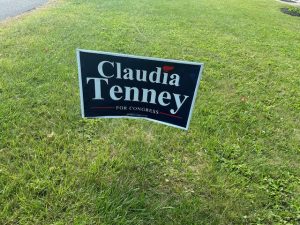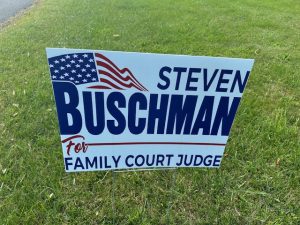 (Albany, NY ) – On September 18, 2024, a federal district court judge sitting in the U.S. District Court for the Northern District of New York granted our request for a Temporary Restraining Order (TRO), thereby halting the enforcement of a section of the Sign Regulations of the Town of Fleming, New York, which prohibits the display of political signs until 45 days prior to an election.
(Albany, NY ) – On September 18, 2024, a federal district court judge sitting in the U.S. District Court for the Northern District of New York granted our request for a Temporary Restraining Order (TRO), thereby halting the enforcement of a section of the Sign Regulations of the Town of Fleming, New York, which prohibits the display of political signs until 45 days prior to an election.
Our lawsuit challenging this unlawful speech restriction was filed on behalf of Andrew Cuddy, a New York resident and Marine veteran who displayed on his private business property four campaign signs for Republican candidates.
Cuddy posted the signs on his private business property on September 4, and the next day the Town’s Zoning Officer issued Cuddy’s business a Notice of Violation/Order to Remedy, directing and ordering Cuddy to remove the signs by October 5, 2024 or else he would face severe punishment. Pursuant to the Notice,
“If the person or entity served with this order to remedy fails to comply in full with this order to remedy within the thirty (30) day period, that person or entity will be subject to a fine of not more than $1,000 per day of violation, or imprisonment not exceeding one year, or both.”
The relatively small campaign signs posted on Cuddy’s private property cause no adverse impact on public health, safety, or welfare. They do not block sight lines, obstruct vision or rights of way, and they are not dangerously distracting, nor do they cause any hazards to motorists or pedestrians.


Additionally, the imposed time period restriction, which does not apply to other types of temporary signs, undermines core political speech even more so today as New York, like many states, allows for voting by early mail ballot or absentee ballot well before the election day. And “campaigns” for candidates run far longer than just 45 days prior to an election. Thus, it is important to be able to display political signs longer than the limited duration allowed by the Town’s Sign Regulations.
As we argued in our memorandum of law filed with the Court, this disparate treatment of political signs is a content-based restriction on the fundamental right to freedom of speech. Consequently, it is subject to strict scrutiny, the most demanding test known to constitutional law.
As stated by the Supreme Court,
“Content-based laws . . . are presumptively unconstitutional and may be justified only if the government proves that they are narrowly tailored to serve compelling state interests.” And “[a] law that is content based on its face is subject to strict scrutiny regardless of the government’s benign motive, content-neutral justification, or lack of ‘animus toward the ideas contained’ in the regulated speech.”
The Town’s restriction on political signs does not come close to complying with the First Amendment, and the judge agreed, prompting her to issue the TRO.
This case will proceed as we pursue a final order striking down for good this patently unconstitutional restriction on free speech.
